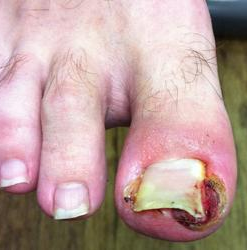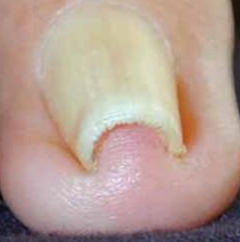What To Do For an Infected Ingrown Toenail?
Preventing Ingrown Toenails is Better Than Treatment
To prevent or avoid Ingrown Toenails patients should consider these precautions:
- Before cutting your toenails,
- Check your nail trimmer is clean,
- Soak the nail in warm water, or cut nails after a shower or bath,
- Do not allow your toenails get ripped or torn,
- Avoid causing repeated stress to the sides of the nails,
- Toe space should not be too restricted or too cramped.
- Always only wear well fitting shows and avoid tight high heels.
Treating an Infected Ingrown Toenail
Ingrown toenail infections are generally treatable at home if you can get under the part of the nail that is digging into your flesh without causing further toe flesh damage.
Gently pull the skin using a piece of dental floss, but don't force it and keep your hands clean.
- To soften the region, soak your foot in warm water with Epsom salt or coarse salt. This will aid in the drainage of pus and the relief of discomfort,
- Apply an antibiotic or antifungal lotion directly to the nail as well as the skin beneath and around the nail,
- Take over-the-counter pain relievers to help with symptoms including soreness and swelling.
Where the ingrown toenail recurs and repeated home care does not resolve the problem, the ingrown toenails can worsen.
When to See a Podiatrist About Infected Toe Nails?
Consult a podiatrist if your infection does not clear up within a few days. They may be better able to lift and get beneath the nail, making topical antibiotic treatment easier.
Among the treatments your doctor may attempt are:
- Putting antibiotic-soaked gauze beneath the nail to remove infection and promote regular nail growth
- Clipping or cutting off the ingrown portion of your nail
- In the event of a major or persistent condition, surgery may be required.
If a bone infection is suspected, your podiatrist may order a blood test to determine the extent of the illness. Among the other tests are:
- X-ray
- MRI
- bone scan
- bone biopsy if your doctor suspects osteomyelitis, a rare complication
What is Ingrown Toenail?
An ingrown toenail occurs when the edge or corner tip of the nail pierces the skin, growing back into it. This potentially painful condition can happen to anyone and usually occurs in the big toe.


Who is at Risk of Ingrown Toenail?
A frequent problem that commonly affects your big toe is an ingrown toenail which is a foot problem. While everyone can get Ingrown Toenails, persons who have the following conditions are at a higher risk:
- Unusual gait and poor foot mechanics, such as pronation
- Deformities of the foot or toes, such as bunions, hammertoes, and flat feet
- Arthritis, Obesity, or Diabetes, and
- Athletes, especially stop-and-go sports like tennis, soccer, and basketball
What Are the Signs and Symptoms of an Ingrown Toenail?
The following are the signs and symptoms of an ingrown nail:
- Pain
- Swelling
- Redness or skin red around a toenail, generally the big toe
- The sharp end of the nail will press into the flesh on one or both sides of the nail.
- Pus coming from the area surrounding your nail
- Bleeding
- The nail is covered by the skin.
What are the Causes of Ingrown Toenails?
The causes of ingrowing toenails vary, however they are usually related to:
- Tight-fitting shoes, socks, or tights that crowd your toes, putting pressure on your toenails,
- Poor toenails clipping such as cutting your toenails too short or not straight across,
- Toe injuries such as a stubbed toe,
- Poor Foot Hygiene,
- Picking or tearing the corners of your toenails,
- Fungus infection of the nails (onychomycosis)
- Excessive sweating or sweaty feet, making your skin soft and easier for toenails to dig in, and
- Toenails with naturally curved edges or that are fan-shaped.
What is the Impact of Ingrown Toenail?
An Ingrown Toenail’s impact can impact you by:
- Causing pain and discomfort,
- Becoming inflamed (tender, red and swollen), and
- Becoming infected.
Ingrown Toenail Infections Risks
An ingrown toenail can cause a fungal or bacterial infection. MRSA, a drug-resistant staph infection, for example, thrives on skin and can cause illness.
MRSA infections can spread to the bone, necessitating weeks of intravenous antibiotics and, in some cases, surgery. It is critical to treat infected ingrown toenails as soon as possible in order to avoid this issue.
Any disorder that lowers blood supply to the feet or causes nerve damage to the feet might also delay healing. Infections are more common as a result, and they are more difficult to cure.
Gangrene is one of the complications that can arise from difficult-to-treat illnesses. Typically, surgery is required to remove dead tissue with this condition.
Next Step
Call Eastpoint Podiatry at Edgecliff on (02) 9362 4111 or visit East Point Podiatry to book a time.

